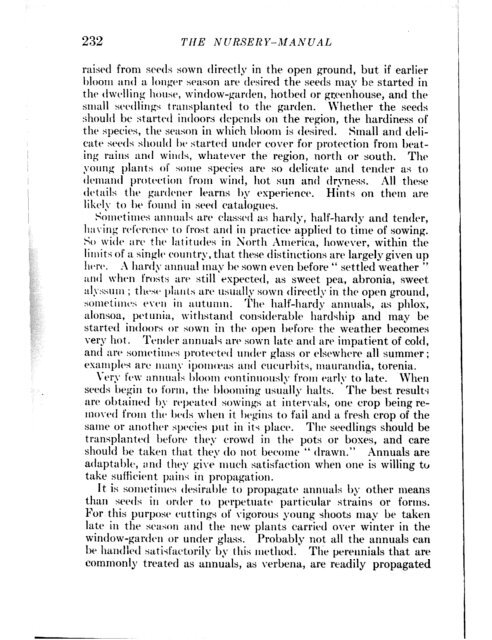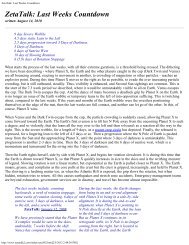- Page 1 and 2:
CHE REFERENCE LIBRARY A project of
- Page 4 and 5:
THE AL BY L. PI. BAILEY
- Page 6 and 7:
EXPLAXATION 7’111s Manual is thci
- Page 8 and 9:
. \ CIiAPTER IV. PROPAGATION HY MEA
- Page 10 and 11:
. Raspberry and blackberry anthracn
- Page 12 and 13:
. ANUAL PR.OPAGATION
- Page 14 and 15:
2 THE NURSERE’-MANUAL on the coat
- Page 16 and 17:
I Ever)* part of tllrk I)latlt whic
- Page 18 and 19:
\ I I -- --.. -“-,a - ._ --- PC .
- Page 20:
8 THE NURSERY-MANUAL need the seeds
- Page 24 and 25:
PROEzAGATIQN BY MEANS OF SEEDS AND
- Page 26 and 27:
PROP2IG,4TION BY MEANS OF SEEDS AND
- Page 29 and 30:
1.6 THE NURSERY-MANUAL the earth be
- Page 31 and 32:
18 THE NURSERY-MANUAL ;; 2: as show
- Page 33 and 34:
20 THE NURSERY-MANUAL the double pu
- Page 35 and 36:
If seeds are buried in the grouncl
- Page 37 and 38:
24 THE NIJRSER~‘-,lilANTJAI, Seed
- Page 39:
G? = sl I THE NURSERY-MANUAL SAMPLE
- Page 42 and 43:
PROPAGz4TION BY MEANS OF SEEDS AND
- Page 44 and 45:
FIG. 10. imtruruents for seed exan~
- Page 46 and 47:
PROPAGATION BY MEANS OF SEEDS AND S
- Page 48 and 49:
PROPAGATION BY MEANS OF SEEDS AND S
- Page 50 and 51:
the agcnq. of frost, if properly ha
- Page 52 and 53:
PROP,4GATION RP MEANS OF SEEDS AND
- Page 55 and 56:
42 Heavy canvas or burlap, 216 squa
- Page 57:
44 TIiE A'II'RSERY-~~AII'UAL the pa
- Page 60 and 61:
FIG. 26. Tracy seed-planter. the su
- Page 63 and 64:
50 THE N [JRSER I’--MA N IT.4 I;
- Page 65 and 66:
PROPAGATION BY MEANS OF SEEDS AND S
- Page 67 and 68:
anal the (*onCiititbil of tlic 5oil
- Page 69 and 70:
PROPAGATION BY MEANS OF SEEDS AND S
- Page 71 and 72:
&Nc to keep- the bulbs as strong an
- Page 73 and 74:
PROPAGATION BY SEPARATION AND DIVIS
- Page 75 and 76:
PROPAG.4TION HY SEPARATION AND DIVI
- Page 77 and 78:
is mostI!. concerned with bulb-like
- Page 79 and 80:
PROP.4 C.4 TI0.Y I3 I’ SEPA Ra4TI
- Page 81 and 82:
PROPAGATION RY SEPARATION AND IllVI
- Page 83 and 84:
CHAPTER IV PROPAGATION BY MEANS OF
- Page 85 and 86:
PROPAG*41’ION BY LAYERS AND IiUiv
- Page 87 and 88:
PROPAGATIOIV BY LAYERS AND RUNNERS
- Page 89 and 90:
W. a r+ i; c % C. 5 ‘== e. b c: %
- Page 91:
PROP.*IG;1TION BY LAYERS AND RUNNER
- Page 94 and 95:
CHAPTER V PROPAGATIQN BY MEANS OF C
- Page 97 and 98:
82 THE NURSER)'-hlA21'T!AI, the win
- Page 99 and 100:
84 THE NURSERY-MANUAL are curious a
- Page 101 and 102:
111 commercial establishments, cutt
- Page 103 and 104:
88 THE NURSERY-MANUAL bth regularly
- Page 105:
90 7’HE N TJRSERY-MAN UAL I \, Fr
- Page 108 and 109:
PROPAGA TIOA’ B,- ME.4N.9 ffk’
- Page 110 and 111:
the cuttings are kept ” quiet”
- Page 112 and 113:
I’K(~P.4 (2.4 7’10.1; BE’ MEA
- Page 115 and 116:
100 THE N lJRSER Y-MA N IJA I, stoc
- Page 117:
twgonias, also, tlw hole leaf may b
- Page 120:
in moss, said or sawdust in a cella
- Page 123 and 124:
108 THE NURSERY-MANUAL 1. - In maki
- Page 125 and 126:
i10 THE NURSERY-MANUAL months. If b
- Page 127:
ll’t THE NIJRHERY-MANtJAL The rea
- Page 130 and 131:
114 THE IVURSERY-MANUAL would not a
- Page 132 and 133:
116 TIIE NURSERY-MA NiJAL ing of un
- Page 134 and 135:
I 118 THE NURSERY-MA.NUAL ing, or g
- Page 136 and 137:
111 the sw,mii of greatest growth i
- Page 138 and 139:
the operation is tlwr-. tedious and
- Page 140 and 141:
124 7’HE .V URSEIt I'-ilILt N (!.
- Page 142 and 143:
126 THE NURSERY-M,4NUAL smooth and
- Page 144 and 145:
12s ‘I’HE N17RSERF-MANUAL The i
- Page 146 and 147:
130 THE NURSERY-MANUAL off just abo
- Page 148 and 149:
sowing. In peaches, the bud will pr
- Page 150 and 151:
134 It would not profit us to pause
- Page 152 and 153:
136 THE NURXERY-MANUAL extends only
- Page 154:
138 Tflh’ NUiiS;ERY-i!lAN UAL l
- Page 158 and 159:
144 THE NURSERY-MANUAL end of the c
- Page 160 and 161:
146 THE NLrRSERY-MANUAL lished. Som
- Page 162 and 163:
148 THE NURSERY-MANUAI, dressil,g,
- Page 164 and 165:
1 I, n . I... _ L _. arc c!lett-~ra
- Page 166 and 167:
152 THE NURSER Y-MAN I/AL tree is t
- Page 168 and 169:
154 THE N ~~RSERI’--MAA’~‘UAL
- Page 170 and 171:
150 THE NURSERY-MANliAL the new tis
- Page 172 and 173:
C. 3 5 I. c z -7’ rt- - c cc E
- Page 174 and 175:
1 tie '1'111i A\' I 'K,SEK1'-X.4 N
- Page 176 and 177:
162 THE NURSERY-MANUAL . “The rag
- Page 178 and 179:
l&& ‘I’HE NURSERY-MANUAL and mo
- Page 180 and 181:
with waxed muslin or i’w#ia, and
- Page 182:
purpose of growing n variety 011 an
- Page 185 and 186:
PROPAGATION BY BUDDING AND GRAFTING
- Page 187 and 188:
PLATE VI. A nursery of ornamental s
- Page 189 and 190:
174 THE NCTR,SERY-MANUAL loamy on t
- Page 191 and 192:
176 THE NURSERY-M-ANUAL l~usba&~~,
- Page 193 and 194:
178 THE NURSERY-MANUAL Q~S~~II~~N n
- Page 195 and 196: 180 THE NURSERY-MANUAL A first-clas
- Page 197 and 198: 152 THE NURSERY MANIJAL Peach, 1 ye
- Page 199 and 200: IS4 THE NURSERY-,MANITAL Persimmon
- Page 201 and 202: 18t.i THE NliRSERY-MANUAL One never
- Page 204 and 205: CERTAIX ELEikIENTS IN NURSERY PRACT
- Page 206 and 207: fall prematurely, thus retarding th
- Page 209 and 210: . 194 THE NURSERY-MANK4i punctures
- Page 211 and 212: 196 THE NURSERY-MANUAL ga.11 infect
- Page 213 and 214: 198 7’IlE NURSERY-MANTJA I, certa
- Page 215: 200 TllE NIJRSERY-MANIJAL &ITIRACNO
- Page 218 and 219: .-ihoulrl bc ma(lc soon after tllc
- Page 221: CERTAIN ELEMENTS IN NURSERY PRACTIC
- Page 224: The spots are first small, but tliP
- Page 227 and 228: CERTAIN ELEMENTS IN NURSERY PRACTIC
- Page 229 and 230: ~ERT,i IN El,E~IfENTR IN N IJRSERY
- Page 231: CERTAtIN ELEilIE,VTS IN NURSERY PRA
- Page 234: 220 THE NURSERY-MANUAL (‘ones sho
- Page 238 and 239: TftE N URSh’fZ Y-LIST 223 t, I )e
- Page 241: 226 THE iVURi?ERY--MANUAL alk to al
- Page 245: Androsace. I’riw rr~crct~~. I’r
- Page 250 and 251: THE NURSERY-LIS7’ 235 selves are
- Page 252 and 253: T/II3 NURSER Y-LIST 237 L>warf stoc
- Page 254 and 255: 7’11 E ;Y I ~R:rS/(:R 1’ /,ILS7
- Page 256 and 257: TTTE N URSERY-tTST 241 tings are ta
- Page 258: THE N TJRSER E’--LIST 243 to give
- Page 261: 246 THE NURSERY-MANUAL Auricula ( P
- Page 264: 7’ II I!: N URSR R I’--- I, IST
- Page 268 and 269: TIll.3 X URSERI--LIST 251 Berberis
- Page 271 and 272: 254 THE NURSERY-MANUAL Blandfordia.
- Page 273 and 274: Il’ittfvr wffiup. - Jlalcc the cu
- Page 275 and 276: Bougainvillea. ;l’!lctcr~li~rctCc
- Page 278 and 279: Buxus (Isos) . Ihrflcr cr. Propagat
- Page 280 and 281: THE NURSERY-LIST 263 always more or
- Page 282 and 283: THE NURSERY-LIST 265 Calaciium. A r
- Page 284 and 285: -. 7’lZE N URSER I’--LIST 267 i
- Page 286 and 287: THli: NURSERY-LIST 2% may be used ;
- Page 288 and 289: ‘j%e stalks e;~n 1~ kept 01’er
- Page 290 and 291: TfiE NURSERY-LIST 273 Celtis (Nettl
- Page 292 and 293: THE NURSERY-LIST’ 275 quince, gro
- Page 294 and 295: PLATE 1s. Two-yex budded cherry. on
- Page 296 and 297:
278 TIIE l~liR,S~~IR}‘--,ll.il:VI
- Page 298 and 299:
280 THE’ NURSERY-MANUAL Chorizema
- Page 300 and 301:
232 THE N URSE R Y-MAN UAL Cinerari
- Page 302 and 303:
284 THE NURSERY-MANUAL Clianthus (G
- Page 304 and 305:
286 THE NURSERI’-Il~;lN~?rlL Codi
- Page 306 and 307:
288 THE NI~R~‘;E’RY-i12;1NIJrlI
- Page 308 and 309:
290 THE NURSERY-MANUAL growth than
- Page 310 and 311:
292 THE ArURSERY-MANU.4L to firm th
- Page 312 and 313:
294 'I'ijE ili'l!RSERl'~~ ,Ii,4Nli'
- Page 314 and 315:
296 THE NURSE’RY-*~/lAn:Cl;1L Cyp
- Page 316 and 317:
298 THE l~C’RSER?‘-,1I,~NUAL it
- Page 318 and 319:
7’IiE N URSERY-MANCJA L own a.cco
- Page 320 and 321:
302 THE NURSERY-MANIJAL Dillenia. n
- Page 322 and 323:
304 1’lIE NURSERY-MANUAL Drosera
- Page 324 and 325:
306 THE NURSERY-MANUAL Empetrum (C
- Page 326 and 327:
308 THE NURSERY-MANUAL Ericace=. He
- Page 328 and 329:
I 310 THE NURSERY-MANUAL Eugenia. J
- Page 330 and 331:
312 l’IIE NtJRSERY-MAN UAL Felici
- Page 332 and 333:
314 THE iVTTRSERY-M.4 NI.r.4 1, cut
- Page 334 and 335:
316 7’111:: s ultsm y-m N Uit I,
- Page 336 and 337:
318 7’Iif?’ ,~lJRSERY-i;llANI.?
- Page 338 and 339:
4 320 I’IIE NURSERY-MANUAZ; Gledi
- Page 340 and 341:
322 THE NURSERY-MANUAL Gourds (&~cu
- Page 342 and 343:
324 ?‘llfi; 1VI/RSERY-MANUAL is s
- Page 344 and 345:
3% 7’ZlR iZiIJRL~ERE’-;1’.4R:
- Page 346 and 347:
32s 7’1IF: I~l~XL~~K11T-r\Jr4.~rr
- Page 348 and 349:
3m Y’HI!: NURS’E’RY-il/lAiVI/
- Page 350 and 351:
332 THE NURSERY-~~~,42\i’i,T,4L H
- Page 352 and 353:
THE NlJRSERY-LIST 333 ripened wood
- Page 354 and 355:
‘I’llIt ,1;UR,SERl’--I,IS7 33
- Page 356 and 357:
THE NtJRSERY-LIST 337 Hyd.rangea, I
- Page 358 and 359:
THE NURSERY-LIST 339 Iochroma. So~n
- Page 360 and 361:
THE N ITRSERY-LIST 341 Jasminum (.J
- Page 362 and 363:
THE N lJRSERS--LIST 343 KalanchoE.
- Page 364 and 365:
THE’ N URKh’RY-LIST 345 Lamar&a
- Page 366 and 367:
7’NE 1’I!RSERY-LlST 347 Wood cu
- Page 368 and 369:
THE NURSERY-LIST 349 Ligustrum (Pri
- Page 370 and 371:
TfIE NliRSERY-I,IST 351 Liriodendro
- Page 372 and 373:
THE NURSERY-LIST 353 heat ; when ro
- Page 374 and 375:
‘y’HI;I R’VR,SRR,‘-I,I,ST 3
- Page 376 and 377:
THE NURSERY-LIST 357 for sowing tky
- Page 378 and 379:
THE N IIRSERY--LIST 359 Plunge the
- Page 380 and 381:
Milla. IIltTt‘iLStVl TIII!: N II
- Page 382 and 383:
THE NURSERY-LIST 363 one part, sand
- Page 384 and 385:
THE NURSERF-IAS7 365 will also root
- Page 386 and 387:
7’11E iVI!R,SER~‘-I,IS7 367 ,\
- Page 388 and 389:
‘I’FlE N URSERY-LIS? 369 if ktq
- Page 390 and 391:
THE N URSERl’--LIST 371 Sour oran
- Page 392 and 393:
7’1TE .Y ITIZ,‘;‘~Tt~’ 1,IS
- Page 394 and 395:
Tlllj: A’T~R,SERY--LIST 375 ol(l
- Page 396 and 397:
7’16fC hrURRERY--LIST 377 Seeds,
- Page 398 and 399:
THE N ULRSER Y-LIST 3’19 Papaya,
- Page 400 and 401:
TIJE NURSERY-LIST 381 tht>!, gi~eha
- Page 402 and 403:
THE NURSERl’-LIST 383 back proces
- Page 404 and 405:
THE NURSERY-LIST 385 The pear can a
- Page 406 and 407:
PLATE XL. Horse-help in the nursery
- Page 408 and 409:
388 THE NURSERY-MANUAL IWliSpurS, c
- Page 410 and 411:
390 1’lIlS N URSEIZ I’- MA N un
- Page 412 and 413:
392 THE NURSERY-MANUAL Philodendrsn
- Page 414 and 415:
384 !i?HE NURSERY-MANUAL o\-cr the
- Page 416 and 417:
396 THE NURSERY-MANUAL seeds. Hand-
- Page 418 and 419:
398 THE NURSERY-MANtJAL Platanus (P
- Page 420 and 421:
400 THE NURSERY-MANUAL light soils.
- Page 422 and 423:
I 402 THE NURSERY-MANlJAL Polypodiu
- Page 424 and 425:
THE NURSERY-MANUAL peach, while on
- Page 426 and 427:
St(WtiS :IS ilWl’1)’ rt’lil t
- Page 428 and 429:
408 THE NURSERY-MARrUAL . Ranunculu
- Page 430 and 431:
410 THE N URSERY-M.4 N UA L Rheum (
- Page 432 and 433:
412 THE NURSERY-MANUAL Rochea. Cras
- Page 434 and 435:
414 THE NTJRSERY-MANUAL sucl;ers ar
- Page 436 and 437:
416 THE NURSERY-MANUAL Sambucus (El
- Page 438 and 439:
418 THE NURSERY-MANUAL Schomburgkia
- Page 440 and 441:
420 THE NURSERY-MANUAL Shortia. Dia
- Page 442 and 443:
L.pJtJ THE h’CJRSERY-MANCJAL Soyb
- Page 444 and 445:
THE NURSERY-LIST 423 Spandias (Hog-
- Page 446 and 447:
THE NURSERY-LIST 425 the young plan
- Page 448 and 449:
THE XURSERY--LIST 427 special strai
- Page 450 and 451:
THE NURSERY-LIST 429 for retinospor
- Page 452 and 453:
7’IiE N IJRSERY-LIST 431 Thunia.
- Page 454 and 455:
THE NURSERY-LIST 433 Tricyrtis. Lii
- Page 456 and 457:
THE NURSERY-LIST 435 Vaccinium (Swa
- Page 458 and 459:
THE iVURSERY-LIST 437 handled in fr
- Page 460 and 461:
THE NURSE rEY-LIST 439 Water-Cress
- Page 462 and 463:
7’HE S I:RSERI’-LIST 441 Zingib
- Page 464 and 465:
444 INDEX Aquifolince;p. 338. 365 i
- Page 466 and 467:
446 INDEX (‘hink:il)ill, IYatw, X
- Page 468 and 469:
448 INDEX Forestry seed-sowing, 51
- Page 470 and 471:
450 PNDEX Lfxdwort~, 4OG I,eaf-tdig
- Page 472 and 473:
452 INDEX 3 17, x31, x3;, :;:c. :34
- Page 474 and 475:
454 INDEX s:lpl)r:lw:1’. 331, :;;
- Page 476:
INDEX Tulip Tree, 351 Tupelo, 368 T

















